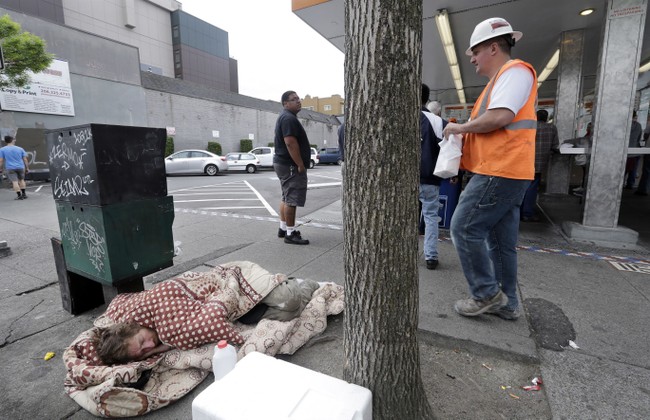
When I was about 12, I was the recipient of what one might call a “good talking to” from my father, who was displeased over the brilliant idea I had conceived to find out what would happen if I shot a small portable propane canister with a .22 rifle. Fortunately, the Old Man noticed what I was up to before I could fire the shot in question, but I was denied the use of my favorite .22 caliber, summertime companion for one month.
Propane tanks, in case you didn’t know, can explode, and while we were unsure if a .22 caliber bullet would have that effect, the Old Man wisely didn’t want me finding out the hard way. (I still don’t know what would have happened had I shot that propane canister, and you can write that lack of knowledge off to a sudden rush of brains to the head.)
Knowing this, you can imagine the concern of some Seattle volunteers, when they found a bunch of propane tanks amidst five tons of trash while cleaning up a homeless encampment:
A shocking discovery rattled volunteer groups cleaning up a Seattle homeless encampment over the Labor Day weekend as they unearthed nearly 80 propane tanks, 20 of which still reportedly contained flammable material.
“We have many camps going up in flames, we see them every day. We see explosions inside our greenspaces, it’s from the propane tanks. It’s a ticking timebomb,” Tim Emerson, program director of nonprofit group We Heart Seattle, told KOMO 4 News, a local outlet.
We Heart Seattle was among the three groups assisting with the cleanup that cleared approximately 5.6 tons of debris, excluding the weight of the tanks, Emerson said.
Here’s the thing: This discovery isn’t shocking, or at least, it shouldn’t be. It’s not even mildly surprising. These “encampments” – I’m tempted to adopt a Great Depression-era idiom and call them “Bidenvilles” – are full of garbage, much of which is hazardous in one way or another. Garbage, human waste, discarded drug paraphernalia – it’s all there. This is known:
In a recent report, (We Heart Seattle’s Andrea) Suarez told the outlet that the same cleanup that uncovered 80 propane tanks also uncovered other dangerous materials, including guns, machetes and blades.
It’s not just propane tanks, guns, and blades. For almost a decade now there have been troubling incidences of disease associated with these areas, including typhus, tuberculosis, and more. Not to mention the discarded needles and human waste.
See Related:BREAKING: Seattle Police End Standoff, Arrest Woman With Gun Who Barricaded Herself in FBI Building
Granted, the propane tanks are an immediate concern because of the serious chance of an explosion. A quick look at any one of these encampments and the people who live in them informs us that they aren’t scrupulous about their surroundings, nor are they overly concerned with the careful and responsible use of their possessions. The only thing surprising about the incidence of fires and explosions is that there are not more of them.
This isn’t a matter of people having been forced out of their homes. This isn’t a matter of a few people on the streets because they are down on their luck. These are encampments full of people with drug and alcohol addiction problems and mental illnesses. Many of them prey on local businesses to support their various habits. This is a crime issue; it is a property value issue; it is a trespassing issue. And most of all, it’s a public health issue. The ancient Romans knew better than to leave human waste and garbage lying in the streets, but America’s homeless population doesn’t seem to have absorbed that lesson.
This problem isn’t limited to the West Coast or even the Lower 48. Here in the Great Land, Anchorage is troubled with growing numbers of these encampments, and aside from all the problems listed above, here we have the added likelihood of the trash-strewn Bidenvilles also attracting bears. It’s already happening. One might note as well that our bears here are not to be taken lightly. And, yes, there are both black bears and grizzlies, even in Alaska’s largest city.
The work volunteer groups like We Heart Seattle are doing is great. It helps, and our cities sure seem to need all the help they can get. But the problem won’t end until the people living on the street are moved off the street, perhaps into some structured, barracks-like setting, to be cleaned up, dried out, and turned into something useful to themselves and society – or, in some cases, institutionalized, if they are too far gone.
It’s a harsh solution. But this simply can’t go on. Not in Anchorage, not in Seattle, not anywhere.





